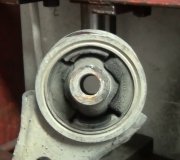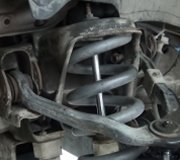The refrigerator broke down because it felt sorry for the busted stove, then the dishwasher gave up in protest, and on and on. That's the official reason why multiple things break down at the same time.
There are many things we see over and over on certain car models, such as power steering pumps on GM front-wheel-drive cars, and front wheel bearings on any front-wheel-drive car. It's hard to get a good answer on what is excessive repairs from a mechanic because all we see all day long are broken cars. There's a lot more GM vehicles on the road, so it stands to reason we will see more of them in our shops. We see the real expensive cars too. They break down just as often, but they are repaired with more-expensive parts.
The problem for you is to figure out when the cost of repairs is likely to keep on adding up to the point those costs exceed the car's value to you. As a former TV repairman, I used to tell people the best time to trade in an old TV was when it needed an expensive repair. You might get 50 bucks trade-in toward a new TV if that old one was broken, but you would only get 75 dollars trade-in if you had the $100.00 repair performed first. You won't get your money back for the repair cost. Same with a car that needs a $2,000.00 repair. If you spend the $2,000.00 on the repairs, then trade the car, you might only get $2,000.00 trade-in value. If you trade it in broken, you might still get $1,500.00 trade-in value. Dealers expect cars to have problems when they're traded in, so they make their offers accordingly. Most of us rarely trade in a car when there is nothing wrong with it.
To introduce another clinker, determining a car's value isn't always a good way to figure out if it pays to have an expensive repair performed. I have an old 1988 Grand Caravan that was so reliable, never got stuck in snow, and could tow and haul more than a lot of pickup trucks. The only expense for many years was for oil changes and used tires. I had to stop driving it because it was so rusty, the carpet was the only thing holding the front and rear together. I would have been willing to stick an engine or transmission into it if I had to, even though it was only worth what I could get for scrap metal. I've had other cars that were only a few years old, but I hated filling the gas tank, because to me, that doubled the car's value! The dollar value of the car is only relevant when you're buying or selling it. At other times, you have consider how much you trust it, how much you like it, and the fact you know how to run the controls. A lot of us spend more on a repair than what the car is worth, but then we have to worry if another big expense if going to pop up. I realize I'm getting off topic. My intent was to put your mind at ease over these repairs.
At any rate, nothing you listed is out of the ordinary, and we'll keep our fingers crossed it stays that way. Please come back and see us again.
Friday, December 14th, 2018 AT 4:25 PM


